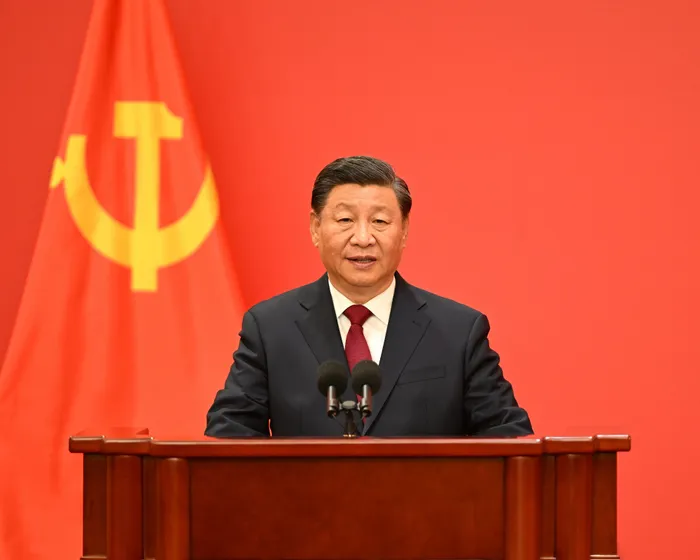China: peaceful, stable global environment will boost world prosperity

indispensable.
Picture: Li Xueren/Xinhua - President Xi Jinping. The objective of the GSI is to eliminate the root causes of conflict, strengthen the global security governance architecture and promote peace and development, the writer says.
By David Monyae
China released the Global Security Initiative (GSI) Concept Paper on February 21, 2023. The GSI was first proposed by the Chinese President Xi Jinping in a speech he gave at the Boao Forum for Asia in April 2022.
President Xi emphasised that the world was an indivisible security community and stressed the importance of co-operation in addressing global peace and security. The speech highlighted respect for sovereignty and territorial integrity, support for multilateralism and non-interference in the internal affairs of other states.
The new concept paper adds flesh to President Xi’s proposal and gives in-depth insight into how China views its role in global security. It asserts that the world is facing a security and development deficit as a result of the Covid-19 pandemic, the multiplication of regional and local conflicts, unilateralism and protectionism.
The objective of the GSI therefore is to eliminate the root causes of conflict, strengthen the global security governance architecture and promote peace and development.
Among the core principles of the GSI as highlighted in the concept paper include commitment to common, comprehensive, and sustainable security; respect for the sovereignty and territorial integrity of all countries; respect for the United Nations Charter; treating all countries’ security concerns seriously; peaceful resolution of disputes; and addressing traditional and non-traditional security issues.
China’s approach to global security is anchored on global multilateralism and regionalism. It exalts the centrality of the UN in maintaining world peace and security as a legitimate platform where countries work together to thwart threats to global security. It commits to supporting the UN’s New Agenda for Peace as well as contributing to the Secretary-General’s Peace and Security Sub-Fund of the China-UN Peace and Development Trust Fund.
This will ensure that the UN has the resources to engage in effective peacekeeping and peace-building initiatives in affected areas around the world. The strategy also seeks to promote co-operation between major countries such as the US, Russia, and the EU in maintain peace and security. This is important in light of the rising geopolitical tensions between China and Russia on the one hand and the US and its western allies on the other.
Also on the agenda is the continued support for the Treaty on the Non-proliferation of Nuclear Weapons, co-operation on the Chemical and Biological Weapons convention, and ensuring the destruction of weapons of mass destruction.
The non-traditional domains of security co-operation identified by the paper include terrorism, information security, biosecurity risk management, security governance on Artificial Intelligence, international order in outer space, global infectious diseases such as Covid-19, food and energy security, transnational organised crime and climate change.
In terms of the regional approach, the paper identifies five regions that will be the focus of security co-operation namely the Association of South-East Asian Nations (ASEAN), the Middle East, Africa, Latin America and the Caribbean and the Pacific Islands.
Africa and China have been co-operating in peace and security for a long time and it seems this will remain the case. The GSI promises to support African countries and the African Union (AU) and its sub-regional organisations in the resolution of conflicts, combatting terrorism and improving maritime security. Moreover, it pledges to encourage the international community to avail financial and technical resources to enable African countries to combat terrorism and conflict especially in areas such as the Horn of Africa, the Great Lakes region, and the Sahel, where conflict is perennial.
Importantly, the paper stresses the importance of capacitating African countries to deal with peace and security issues independently, without having to rely on outside forces. China has also pledged to support the Outlook on Peace and Development in the Horn of Africa while advancing the institutionalisation of the China-Horn of Africa Peace, Governance and Development Conference.
More broadly, the GSI will also support the China-Africa Peace and Security Forum, which was established through the Forum on China-Africa Co-operation (FOCAC). Africa is also likely to benefit from China’s offer of 5,000 training opportunities for professionals from developing countries in the next five years, which is part of capacity-building measures to improve global security.
The GSI is a logical and strategic step in China’s rise as a major global power. China’s interest in global security is motivated by the need to protect its investments and other economic interests that are spread all over the world.
It is a result of Beijing’s realisation that if China is to maintain the robust growth it has enjoyed over the past four decades, a peaceful and stable global environment is indispensable.
However, it is doubtful that China’s GSI will garner any support from the major countries in the West. Just like they have criticised other Chinese initiatives such as the Belt and Road Initiative (BRI), the GSI is unlikely to be spared.
This is especially so in the light of China’s stance on the Russia-Ukraine war and the recent incident of balloons belonging to China that were hovering above the US airspace and were shot down by the US military.
David Monyae is Associate Professor of International Relations and Political Science, and Director of the Africa-China Studies Centre at the University of Johannesburg
This article is exclusive to The African. To republish, see terms and conditions.